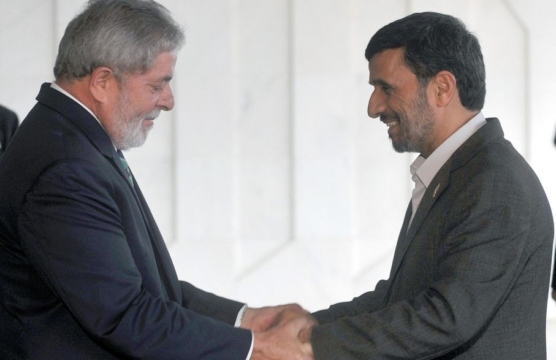Q: After talks with Brazil and Turkey, Iran agreed Monday to send about half of its uranium to Turkey. In return, Iran is to receive nuclear fuel rods processed by Russia and France for use in medical research. The agreement did not avert the Obama administration from announcing on Tuesday that the United States and major powers including China and Russia had agreed to impose new U.N. sanctions on Iran over its nuclear program. Was the deal involving Brazil a victory for President Luiz Inácio Lula da Silva following criticisms of his engagement with Tehran? What will the agreement with Iran do for Brazil's prospects as a leader and negotiator on the global stage?
A: Peter Hakim, member of the Advisor board and president emeritus of the Inter-American Dialogue: "When first reported, the clinching of a nuclear deal with Iran looked like a clear victory for Brazilian President Lula da Silva and his Turkish counterpart, Prime Minister Erdogan. But soon after Lula proclaimed a 'triumph for diplomacy,' Secretary of State Clinton reported that the five permanent members of the U.N. Security Council (the United States, Russia, Britain, France and China) had agreed to further tighten sanctions against Iran—precisely what the Brazil/Turkey accord aimed to avoid. No, the accord was not a diplomatic success for Brazil. Importantly, it fell short substantively. It did not keep Iranian President Ahmadinejad from publicly declaring Iran would not stop enriching uranium, which was the central demand of the United States and other major powers, and it offered no assurance that Tehran would allow adequate U.N. inspection of its nuclear activities. Brazil and Turkey may have believed that (1) they got the best deal they could from Iran, (2) it would, at least, be enough to postpone the imposition of new U.N. sanctions, and (3) their deal would improve the atmospherics for future U.N. negotiations on Iran's nuclear program. If so, they underestimated, first, Iran's determination to advance its nuclear ambitions, unfettered by international restrictions, and second, the urgency that is propelling U.S. policy and the immense distrust and frustration with Iran in Washington. The United States is dead serious about the threat of a nuclear-armed Iran. Still, the agreement with Iran is one more demonstration of Brazil's widening global presence and its growing capacity to shape debate and discussion, if not yet outcomes, on virtually any issue it chooses. Even though it did not accomplish much this time, Brazil once again showed it cannot be ignored—that it has to be taken seriously."
A: Paulo Sotero, director of the Brazil Institute at the Woodrow Wilson International Center for Scholars: "It is too early to tell what will be the impact of this episode on the credibility and standing of the nations interested in the Iran nuclear issue. For all its limitations, the agreement on the exchange of Iranian enriched uranium brokered by Brazil and Turkey is similar to the one proposed in October 2009 by the International Atomic Energy Agency and remains an important element of a constructive solution—one that could bring Iran into full compliance with its obligations with the IAEA. Its collapse would put the world face to face with unpleasant and costly alternatives. Similarly, the adoption of a new set of mild sanctions against Iran by the United Nations Security Council, as proposed by the P5 plus Germany, will have a better chance of being effective and avoid a 'no' vote by non-permanent members Brazil and Turkey, which would weaken the resolution if both countries were included in the core deliberations. In contrast, the approval of sanctions with broad support with Brazil and Turkey abstaining and a delayed activation date could open space for more dialogue and give the international community leverage to achieve the desired objectives. In such a scenario, the efforts of Brazil and Turkey will be seen in Washington and other capitals in a more positive light than they are today. Inevitably, questions are being raised in the Brazilian foreign policy community about the wisdom of the country's high-profile involvement in the issue and the quality of calculations that led the government to incorrectly anticipate the reaction of the United States, China and Russia to the agreement signed with Iran on Monday. In any case, the episode will not diminish President Lula's popularity among Brazilians or Brazil's positive prospects as a rising power."
A: Matias Spektor, visiting fellow at the Council on Foreign Relations and coordinator for the Center for International Relations at Fundação Getúlio Vargas in Brazil: "To know whether this was a victory or a failure, we'll have to see how the Iranians react. If the Iranians send signals of cooperation with the international community, then I think the Brazilians will look at this as a success, even if the Iranians insist on enriching uranium to 20 percent and the Security Council insists that this is not legitimate. For the Brazilians, the notion that there is now an opening for debate with Tehran is in itself a success. You have to bear in mind that this is the first time ever that Brazil has ventured into the Middle East. Outside Brazil, I think there is a sense that Brazil has emerged and is now beginning to flex its diplomatic muscle. There is also an understanding that Brazil is or can be a tough partner, that is, that 'emerged Brazil' is not going to follow the United States at all times, but rather is a growing force to be reckoned with. The important point to keep in mind is that Brazil has been a major beneficiary of world order as we know it, and it is unlikely to seek to revert that order in any major way. Its emphasis will be on piecemeal adaptation and reform."




















